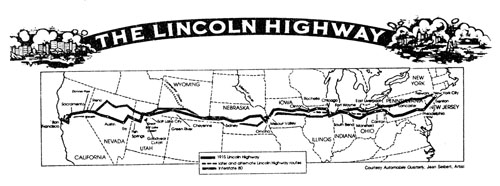|
Home : Quarterly Archives : Volume 35 |
Tredyffrin Easttown Historical Society |
|
Source: January 1997 Volume 35 Number 1, Pages 32–34 The Lincoln Highway: "It's My Turn To Read the Signs" "Your shaving brush Has had its day, So why not Shave the modern way. With Burma-Shave." The years were the '30s and '40s when eight large transport trucks would start rolling out of Minneapolis in the spring headed for the hinterlands. The trucks were manned by PhD's (post-hole diggers), whose job was to install five to seven sets (six signs a set) of Burma-Shave signs daily. At the height of their popularity, more than 700 jingles on 40,000 signs graced and enlivened the American landscape, lining the Lincoln Highway and other roads across the country. "Nineteen sixty-five, No more signs To be read, All torn down Burma-Shave Was dead!" The Burma-Shave signs lined the Lincoln Highway from the East coast to California. Well almost... with the exception of Nevada, where even today the Lincoln Highway (US Route 50) is promoted as The Loneliest Road in America. I guess there weren't many potential shavers living along the 175-mile stretch in the '30s and '40s. Frank Rowsome Jr wrote THE VERSE BY THE SIDE OF THE ROAD: The Story of the Burma-Shave Signs and Jingles in 1965. If you are looking for an interesting little book about an American success story, ask at your local library. It's still around. In 1925 the Burma-Vita Company in Minneapolis was in a lather. The small company that brought the first brushless shaving cream to market was going broke. Its product, Burma-Shave, was going nowhere until one of the founder's grandsons came up with a very unique advertising program. The concept of six signs by the side of the road simply wouldn't sell, the advertising experts said. Sales Management magazine wrote, "Wouldn't a legitimate advertising campaign do better?" Well, they were wrong. Sales and reorders started rolling in. It had been a close shave (sorry), but the company and Burma-Shave had been saved. Burma-Shave signs were 100 paces apart, each meant to be read in two seconds at 35 mph. Later as the roads were improved and speeds increased, the spacing between signs was adjusted to as much as 50 yards. Travelers who grew up in the 30s, 40s and '50s can remember being with the family on a Sunday drive when a set of Burma-Shave signs came into view. Everyone in the car would know the words on that final sign ... and in unison you could hear them shout... BURMA-SHAVE! The messages on the signs were always upbeat, positive, humorous and above all, they were fun to read. Everyone had their favorites: "Said Farmer Brown Who's bald on top, Wish I could Rotate the crop. Burma-Shave." The company was one of the first to stress safety on the highways: "He saw the train And tried to duck it. Kicked first the gas And then the bucket. Burma-Shave." Even though gasoline was rationed, they even urged on the war effort in the '40s with a plug for defense bonds: "Maybe you can't Shoulder a gun, But you can shoulder The cost of one. Buy defense bonds Burma-Shave." Lost in the turbulence of events in the '60s, all of the signs had been removed from the roadsides by 1965. Why would one of the most successful advertising 'gimmicks' be discarded? The answer is simply that they had stopped being an effective sales tool for the company. Yes, I personally blame the opening of the US Interstate highway system on why the signs were less effective ... but, being a Lincoln Highway road nut... I blame the Interstate roads for everything. Allen G. Odell, age 90, died on January 14, 1994, in Edina, Minnesota. He and his brother Leonard, who had died two years earlier, were the creators of the early roadside signs advertising Burma-Shave cream, the product pioneered by their father. When the signs came down after the company was sold by the Odells to Philip Morris Cos., Inc., someone erected a tribute to Al Odell: "We miss the rhymes That used to sell, The shaving cream Of Al Odell. The memories will soon be gone." America had changed, perhaps not for the better. As Alexander Wolcott sagely observed, "It was as difficult to read only one Burma-Shave sign ... as it was to eat only one peanut."
|
